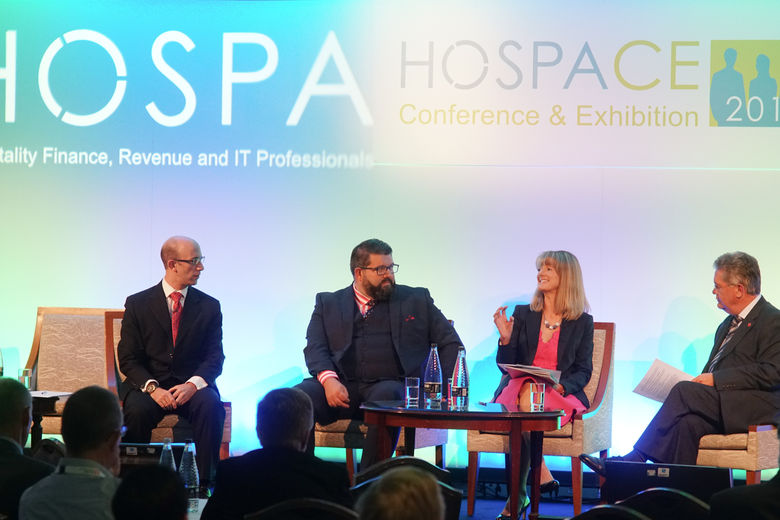
The conversation during the networking breaks may have been filled with the latest political scandals, but it was how to respond to efforts by those denizens of the Palace of Westminster to negotiate in favour of the UK which dominated the day’s debates at last week’s HOSPACE2017.
Nearly 500 delegates attending HOSPA’s annual Conference and Exhibition - held at the Royal Lancaster Hotel in London - listened to comment on migration, technology and the myriad of challenges and opportunities facing the market.
Attendees gathered for the reunion of last year’s panel on Brexit, eager to hear how opinion had shifted. The issue of staffing was key, with Jeremy Robinson, partner, Watson Farley Williams, telling delegates: “Immigration is a fundamental issue to resolve. The question of bringing in visitors to the EU must also be addressed. Whilst we can't expect anything from our government as a sector, we can keep the pressure up over aviation and migration.”
Mark Essex, director, public policy, KPMG, added: “There aren't many certainties around Brexit, but the cost of wages is going up. Rather than lobbying government, I would look at what I can do to mitigate what can only be upward wage pressure. Retention is important. Productivity and innovation is important.
“We have businesses who are assuming a Brexit cliff edge and actively planning for that.”
At one of the many workshops which took place during the event, attendees heard from Eproductive and the University of Surrey that the number of hours worked by UK employees had gone down, in addition to the number of UK employees, while labour from the EU was up and the number of hours EU labour had worked was up.
Professor Andrew Lockwood, University of Surrey said: “I couldn’t possibly comment on whether EU workers are more productive than UK workers. Revenue over the period went up as labour went down, which must mean that productivity has increased.”
With costs rising as a result of the falling pound and rising labour costs, one area in which hotels were being encouraged to economise was in the drive to direct bookings, with the branded hotel operators using their loyalty programmes to offer discounted rates, with varying responses from owners.
Carol Dodds, VP commercial, UK, Interstate Hotels & Resorts, said: “We have seen definite rate cannibalisation, but we are hoping to build a loyal base and strong lifetime members. When member discounts came around and we pushed that through the metasearch engines there was a massive share shift, but the different OTA terms forced us to come out of being so visible and it became quite difficult.”
Hotels were encouraged to play the long game, with Steve Lowy, chairman, Hotel Marketing Association, commenting: “What has to happen is that hotels need to look at commission spend - hotels need to look all the way down. Hotels need to look long term at marketing and staff training and at their websites - customers become loyal to OTAs because of the booking process, not always the price. The book direct message also needs to filter down to the receptionists. The franchise model has potentially caused lots of challenges.”
The sector is currently facing a number of issues around technology, including that of security, with Ted Horner, managing director, EH&A, leading the debate around cyber attacks and how to keep guests and employees safe.
Horner said: “In 2021 it is estimated that there will be $6 trillion in fraud and cybercrime. Now, it has a greater revenue than the drug trade. Cyber crime is growing because it is low risk and low cost. Point of Sale is the greatest area of threat in hotels - the area needs to be focused on in management agreements. At some point you are going to get hacked.”
Addressing this, David Derbyshire, director, IT service delivery, Hilton, and chair of the HOSPA IT committee, said: “When you do your homework on data, look at legacy and stored data. And look at your third parties. Someone's presence and identity is key to the contract with your guests. If you have a breach, imagine the impact on trust.”
“But,” added David Nicolson, VP finance, Jumeirah, and chair of the HOSPA finance committee, “you're only as good as your weakest link. The answer is to have multilayered systems, protect your most important data with the greatest investment.”
Making the matter more complex are the demands of customers, with Horner asking: “Have we reached a stage when we are so eager to remain online that we ignore attaching to unsecured networks? We have traded off the need for privacy and security if there's something in it for us. With the Amazon Echo, are we so concerned that there's a device listening? As we move to an internet of things world, everything is connected with iBeacons - are we also creating more opportunities to be hacked?”
It’s not just those who call hotels their temporary home. Michael Heyward, managing director, Heyward Hospitality Solutions, added: “The breadth and vulnerability of our staff is also something which we need to be aware of, in addition to guests.”
HOSPACE pointed to an industry influx, which was illustrated by an interview with Sally Beck, General Manager of the Royal Lancaster London, where the conference was held. Beck told the delegates that the hotel was due to have become the headquarters of Barclays Bank, but because of a shortage of hotel rooms in London in the 1960s, the developers were incentivised to create a hotel instead. The main conference room had been earmarked to be a bowling alley. Delegates would no doubt agree that the better choice was made.
Next year’s HOSPACE2018 Conference and Exhibition will take place at The Royal Lancaster London on 1st November 2018.